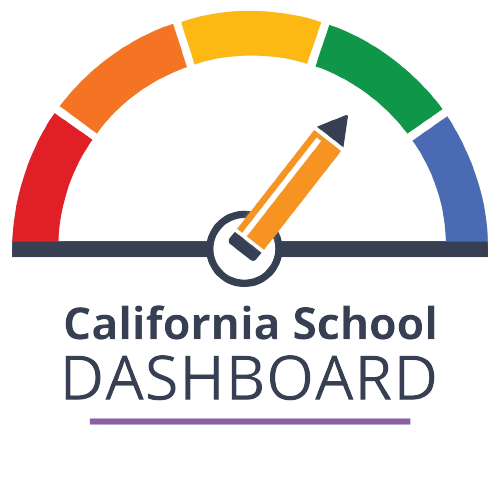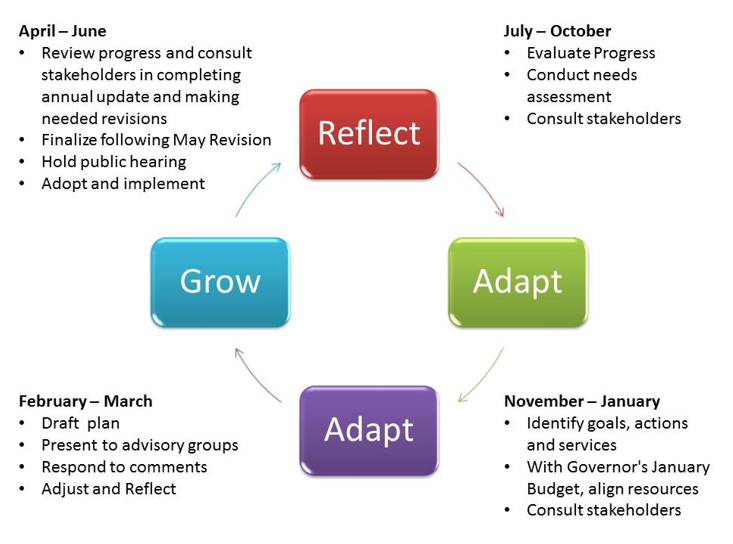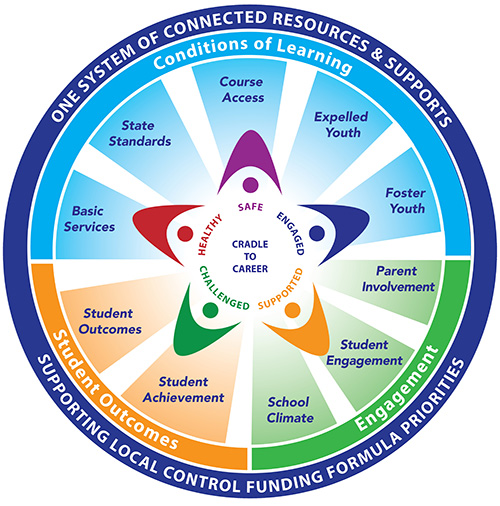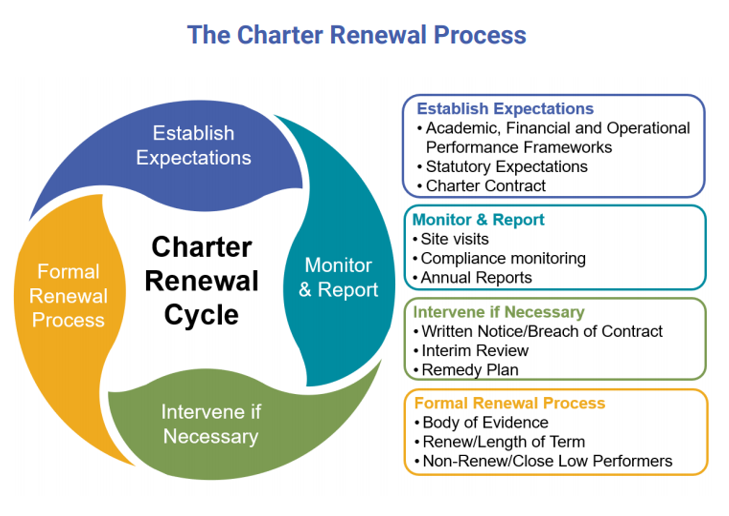Parents have options in choosing a school, though the extent of the options varies from state to state. Parents can exercise school choice in many ways. In many areas, parents can choose from neighborhood schools, charter schools, other public schools of choice, or transfer their child to another public school (in- or out-of-district). They can also select a private school (religious or secular) or teach their child at home. This resource, available in
English and
Spanish, identifies factors you may want to consider before making a decision.
| 
|
Return to top ^
The California School Dashboard is an online tool designed to help communities across the state access important information about K–12 schools and districts. The Dashboard features easy-to-read reports on multiple measures of school success. The Dashboard is just one step in a series of changes that have raised the bar for student learning, transformed testing, and increased the focus on equity. This resource from the California Department of Education, available in English, Spanish, and Vietnamese, explains the 11 measures of school success.
| 
|
Return to top ^
The California Department of Education requires each local education agency (LEA) to complete a Local Control and Accountability Plan (LCAP) every three years in order to set goals, plan actions, and leverage resources to meet those goals to improve student outcomes. These plans are submitted to the state and updated annually.
The LCAP/School Plan is developed by the school site council and must be shared with other school site-level advisory groups in order to seek input about the LCAP/School Plan. Site-level advisory groups may include the English Learner Advisory committee, student advisory groups, and tribes and tribal organizations present in the community.

Each plan must describe:
LEA/school-wide goals, as well as specific actions to be taken to achieve the goals for all students, including specific subgroups of students, in each of the eight state priority areas, plus any locally identified priority areas.
Expected progress toward meeting the goals, and as part of an LEA’s required annual update of the plan, the LEA must describe actual progress made toward meeting the goals and describe any adjustments to be made.
Expenditures required to implement each of the goals and actions, including a description of how additional funds provided for low-income students, English learners and foster youth will be used to increase or improve services for these students.
The process used to involve parents, students, community members, school employees and other partners in developing, reviewing, and supporting implementation of the LCAP.
Parents and families play an important role in the development of the LCAP. LEAs are required to consult with teachers, principals, administrators, other school personnel, parents, and pupils in developing the LCAP. Parents and families can actively engage in developing the LCAP by asking critical questions about the development of the plan. Suggested key questions from the Parent Teacher Association can be found here in English and Spanish.
Return to top ^
The
Local Control Funding Formula (LCFF) is a huge opportunity for parents to shape the vision for your children’s education and make it happen! As California’s school funding law, the LCFF is a way for schools to focus on student success.
Learn more about your role in the LCFF by watching this video.
The LCFF requires local education agencies (LEAs) to involve parents in planning and decision-making as well as in developing Local Control and Accountability Plans (LCAPs). In order to access the funds from the State of California, LEAs must develop a plan on their allocations. The LCAP is the report that LEAs submit to the state outlining their budget strategies and allocations. Learn more about school funding in
English
or
Spanish
using this resource from Families in Schools.
| 
|
Return to top ^
Authorizers are the entities that decide who can start a new charter school, set academic and operational expectations, and oversee school performance. Authorizers should ensure each school has freedom and flexibility to innovate and meet student needs, while also making sure the school is succeeding and open to all.
When a charter school comes up for renewal, the authorizer reviews the school's program and performance to determine if it is meeting the needs of all students. More information about the role of academic data in charter school renewals can be found in
English from the California Charter Schools Association.
|

|
Return to top ^
Section 51101 of the Education Codes affords the following rights to California public school parents (this list is abbreviated list and paraphrased):
-
To be “mutually supportive and respectful partners” with the school.
-
Within a reasonable time to observe their child’s current classroom(s) and/or future classrooms if transferring.
-
To meet with the teacher(s) or principal within a reasonable time of their request.
-
To volunteer in the school or classroom, under supervision of school employees and with approval of the teacher (if volunteering in the classroom).
-
To be notified if their child is absent on a timely basis.
-
To receive the results of standardized and statewide tests.
-
To request a particular school and receive a response.
-
To have a safe environment supportive of learning.
-
To examine curriculum materials of their child’s classes.
-
To be informed of their child’s progress and whom the parent should contact if there are problems.
-
To access their child’s school records (see also Education Code 49069.7 which requires provision within 5 business days).
-
To be provided with data regarding skills and standards their child is to meet.
-
To be informed in advance of school rules, including discipline rules and procedures, attendance policies, dress codes, and procedures for visiting the school.
-
To be informed regarding any psychological testing the school does and to refuse the testing.
-
To participate in parent advisory committees, school site councils, or site-based management leadership teams.
-
To question anything in their child’s records with which they disagree.
This is not an exhaustive list of every right parents may have. If your child has a 504 plan or an Individualized Education Plan (IEP), please talk to your child’s case manager for a copy of Procedural Safeguards for you and your child.
Return to top ^

